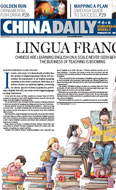Society
Cultural reform not commercialization: official
Updated: 2011-03-01 07:14
By Liu Wei (China Daily)
BEIJING - China's reform of the cultural system does not mean the commercialization of culture, a senior official said on Monday.
"None of the documents and speeches by State leaders have mentioned that the reform of the cultural sector is cultural commercialization," he said in response to a question on whether the reforms will commercialize the industry.
The general principle followed in carrying out cultural reform during the 11th Five-Year Plan (2006-2010) was to draw a line between for-profit cultural industries and non-profit cultural services, Sun added.
The non-profit undertakings aim at providing basic cultural services to the general public and ensure their cultural rights.
"They have a convenient and equal nature and are supported by the government," he said.
From 2008 to 2010, the central government allocated 5.2 billion yuan ($764 million) to facilitate free public admission into 1,743 public museums and commemoration halls nationwide. By the end of 2012, free access will gradually be expanded to art galleries and public libraries.
The for-profit cultural industries, on the other hand, are meeting diversified, multi-field cultural needs of the people, Sun said.
China has been promoting reform of the cultural sector in the past five years, aiming to restructure the old system of art troupes, offer more public cultural services to rural and urban areas, enhance the international influence of Chinese culture and set up a modern cultural market system.
With a prospect of deepening these efforts in the 12th Five-Year Plan (2011-2015) period, Sun spoke of the emergence of low-brow, tasteless content and reinforcing efforts to resist it.
First of all, the government will support selected cultural products that are thought-provoking, well-presented and of high quality, while resisting the pursuit of economic benefits through mindless content.
The government will also evaluate the current cultural awards to make sure they are authoritative and fair.
In addition, the government will strengthen its fight against pornography and illegal publications while intensifying its efforts to protect intellectual property rights.
E-paper

Lingua franca
Chinese are learning English on a scale never seen before and the business of teaching is booming.
Golden run ahead
Looking abroad
Mapping out a plan
Specials

Sentimental journey
Prince William and Kate Middleton returned to the place where they met and fell in love.

Rent your own island
Zhejiang Province charts plans to lease coastal islands for private investments

Self-made aircraft
An automobile mechanic in Northeast China made a test flight of his self-made aircraft which cost about US$395.




